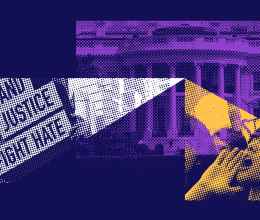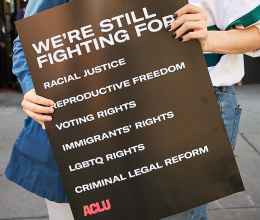
April 24, 2012
Tomorrow, Wednesday, April 25, the U.S. Supreme Court will hear oral arguments on Arizona’s SB 1070, the controversial anti-immigrant bill which legalizes racial profiling by local law enforcement.
Florida Attorney General Pam Bondi has joined 15 other state Attorneys General in an amicus brief to the Supreme Court in support of Arizona’s law.
Arizona Governor Jan Brewer signed SB1070 in April, 2010. Two lawsuits were filed challenging the law. The ACLU, MALDEF (Mexican American Legal Defense and Education Fund), the National Immigration Law Center and other civil rights groups filed the first suit on May 17, 2010. The U.S. Department of Justice filed suit on July 6, 2010. Both suits sought to stop the law from being implemented. After hearing both cases, a federal district court in Arizona issued a ruling only in the federal government’s case. That challenge – the federal case – is now before the Supreme Court.
The following statement is from Howard Simon, Executive Director of the ACLU of Florida, on Attorney General Bondi’s participation in the amicus brief to the Supreme Court.
“Many Floridians are unaware that their Attorney General, Pam Bondi, has asked the U.S. Supreme Court to allow states to make racial profiling a legally-acceptable police practice. She has done so by joining 15 other attorneys general in support of Arizona’s deeply-flawed ‘show me your papers’ law.
“If Attorney General Bondi’s argument prevails and the Supreme Court upholds Arizona’s law, all states -- including Florida -- will be given the authority to pass similar laws by which local law enforcement officials would be empowered to stop and demand the papers of anyone, based on nothing more than how they look or speak. These law enforcement practices open the door for wrongful arrests, harassment and other abuses.
“As Florida’s principal legal officer, the Attorney General should know that racial profiling is bad policing, and that it drives an unnecessary wedge between law enforcement and the communities it protects.
“Taking the opposite position from Bondi, law enforcement professionals including Eduardo Gonzalez, former Tampa Police Chief and the Police Executive Research Forum, whose President was former Miami Police Chief John Timoney urged the Court to reject Arizona’s law. They said it would ‘poison the culture of cooperation in communities most affected with crime. Those who believe their immigration status to be subject to question would have little reason to assist the police to solve very serious crimes – against themselves or against lawful immigrants and U.S. citizens – once they know that their involvement will invariable trigger police scrutiny of their immigration background.’
“By adding her name to the Supreme Court brief, Attorney General Bondi has symbolically given the blessing of all Floridians to laws that threaten people’s rights and make law enforcement more difficult. Focusing on race or national origin in policing sends a chilling message to certain groups – in this case Latino and Hispanic families – that they are under increased suspicion.
“Floridians have a right to know why Attorney General Bondi believes that racial profiling is good policy for Florida.”







